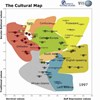period
Futurepol: A Political History of the Future. Knowledge Production and Future Governance in the Post War Period
Professor Jenny Andersson, Sciences-Po, Paris Seminars host is Stefan Svallfors. The seminars are free of charge and take place at 13.00–14.30 in the Institute’s seminar room at Holländargatan 13, Stoc
Tobias Hübinette: The modern history of Swedish whiteness and Swedish race thinking
Tobias Hübinette is Associate Professor in Intercultural Education and a Senior Lecturer in Intercultural Studies at Karlstad University. ABSTRACTThis presentation aims at understanding today's situati
Peter Hedström elected to the board of the Swedish Research Council
Peter Hedström was elected to the board of the Swedish Research Council (VR) on the 4th of December for the period of 2012–2015. The researcher Christofer Edling was elected to the Scientific Council

World Values Survey Cultural Map
This animation tries to describe the change in values in different countries over a period of more than 30 years. Read more about the map at www.worldvaluessurvey.com. The animation is created in c
The Demography of Sweden's Transgender Population: A Research Note on Patterns, Changes, and Sociodemographics
Demography Abstract We examine the prevalence of gender transitions in Sweden over time and document the sociodemographic characteristics of people transitioning in different periods. Using administrati
The Constant Gap: Parenthood Premiums in Sweden 1968–2010
in: Social ForcesAbstractWe know that parenthood has different consequences for men’s and women’s careers. Still, the research remains inconclusive on the question of whether this is mainly a conseque
Gustaf Arrhenius receives prolonged appointment as director of the institute
What sets the framework for the research at the Institute for Futures Studies is research programs, created by the director. The current one, What future? Challenges and choices in the 21st century(201
Democratic revolutions as institutional innovation diffusion: Rapid adoption and survival of democracy
Technological Forecasting and Social Change, Volume 80, Issue 8, October 2013, Pp. 1546–1556 http://dx.doi.org/10.1016/j.techfore.2013.02.002 Abstract Recent ‘democratic revolutions’ in Islamic countries
Family Formation and Men’s and Women’s Attainment of Workplace Authority
2012. Social Forces, 90:795-816. Abstract Using Swedish panel data, we assess whether the gender gap in supervisory authority has changed during the period 1968–2000, and investigate to what extent the g
Episodes of liberalization in autocracies: a new approach to quantitatively studying democratization
Political Science Research and Methods, 1-20 Abstract This paper introduces a new approach to the quantitative study of democratization. Building on the comparative case-study and large-N literature, it








